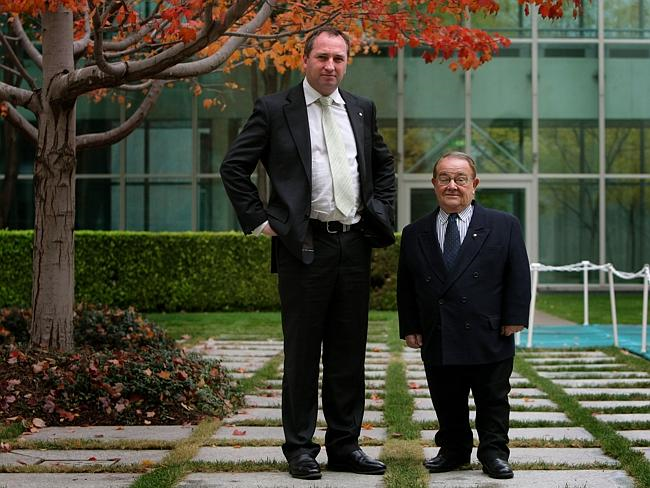
BARNABY Joyce once said the size of Australia’s smallest senator becomes invisible when you know him and that’s the most intriguing thing about Alan Eggleston, who will farewell politics on Wednesday. The 72-year-old is retiring from the Senate.
The former GP-obstetrician was born with a rare cartilaginous condition known as dyschondroplasia. He’s 127cm tall.
When you first meet him, it’s hard to miss. But after 20 years in politics, nobody notices it, and it’s easy to forget the obstacles Eggleston has quietly, determinedly navigated in his extraordinary career.
“It’s strangers that I find make comment, not people I know,’’ Eggleston says. “Especially children, who are naturally curious. Sometimes people get excessively curious; I just tell them to piss off,’’ he says with a laugh.
As a medical student in the 1960s, his teachers noticed he was fascinated by biochemistry, the interaction of hormones and gynaecology. It was intellectually challenging but he also just liked women.
He was affectionately known in Port Hedland, as “the little doctor’’. But the obvious thing about him — his short stature — is not something he even mentioned in his maiden speech, delivered on a fold-up box.
 I didn’t have long to wait to find out the meeting would be extraordinary. One of the readers opened up theproceedings by saying, ‘We want you to resign from the medical course immediately’.
I didn’t have long to wait to find out the meeting would be extraordinary. One of the readers opened up theproceedings by saying, ‘We want you to resign from the medical course immediately’.
– Dr Alan Eggleston 
The story of how Dr Eggleston qualified as a doctor bears repeating because it’s a sad story with a happy ending.
What happened was a bunch of doctors tried to kick him out of medical school for being short.
Many at the Perth school, including Professor Eric Saint, were highly supportive. The dean, a British obstetrician from Hong Kong, suggested he might need a footstool to do surgery. But nobody thought it would be a big deal.
Things seemed to be going well until Eggleston got a call from the Royal Perth Hospital surgery department requesting his attendance at a meeting.
“I didn’t have long to wait to find out the meeting would be extraordinary,” he says. “One of the readers opened up proceedings by saying, ‘We want you to resign from the medical course immediately’.
 I stopped dreaming before sleeping at night. It was as if the television had been turned off and the screen went blank. I felt disheartened and had little confidence in the fairness of the final examination process. I did not, in fact, pass the exams at the end of that year.
I stopped dreaming before sleeping at night. It was as if the television had been turned off and the screen went blank. I felt disheartened and had little confidence in the fairness of the final examination process. I did not, in fact, pass the exams at the end of that year.
– Dr Alan Eggleston 
“I was shocked … and simply said, ‘I have no intention of resigning from the medical course.’ To this the reader replied, ‘Well, in that case, we’ll fail you out of the course in the fourth-year exams.’ Then he said, ‘I will personally make sure that you never graduate in medicine from this university’.
“After some reflection over a few days I decided not to tell anyone what had happened.’’
He considered telling his father that perhaps he should change to a law course, without explaining why.
“But I did not do that, as I felt in some way that this prejudice reflected on me, in the sense that I should have been able to overcome it, and that it would be perceived as weakness if I could not. Then, inevitably, I became depressed.
“I stopped dreaming before sleeping at night. It was as if the television had been turned off and the screen went blank. I felt disheartened and had little confidence in the fairness of the final examination process. I did not, in fact, pass the exams at the end of that year.’’
There were suggestions he could get into the University of Melbourne, but would have to repeat fifth and sixth years. His brother suggested he take qualifying exams for Royal medical colleges in London.
“That was what I did: I was eligible, so I went to London and I qualified there,’’ he says.
Four years later he came home and went to work for the Port Hedland Regional Hospital and Royal Flying Doctor Service clinic. He also became mayor of Port Hedland, regional president of the Liberal Party in the Pilbara and Kimberly, state vice-president and then a senator for WA, in 1996.
“Many years after I first met Professor Saint, who had once been a district medical officer at the Port Hedland Hospital where he had called attention to the danger of asbestos-related diseases at Wittenoom, he came to say hello to me at the Port Hedland Regional Hospital. With a twinkle in his eye, he greeted me as a colleague. I felt very honoured.
“I thought I should record this story because it might provide some inspiration to somebody who feels that because of some physical abnormality they are being held back.
“I think the answer is just to keep on going and you will succeed in the long run.”
Source: Daily Telegraph
